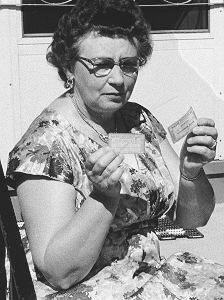When the envelope arrived in the mail one day in the 1930s and she pulled out the paper card and read “078-05-1120” for the very first time, they must have looked like a bunch of random numbers strung together. How could she have known they were a headache that would hound her to her grave?
Hilda Schrader Whitcher was hardly a household name. And 078-05-1120 was one of those new-fangled Social Security numbers the federal government was issuing to each American citizen at the time. She probably didn’t give it a second thought as she tucked the new card into her purse.
Everything changed in 1938. Trouble, they say, comes creeping on cats’ feet. And Hilda’s nightmare began innocently enough at work one day when her boss asked a favor.
Hilda was what we would today call an executive secretary. She worked for Douglas Patterson, vice president of the E.H. Ferree Company in Lockport, N.Y., and he had just had an inspiration.
Ferree made wallets. Patterson was looking for a gimmick, something to make his product stand out from the pack. Then it hit them: Americans were receiving their new Social Security cards from Washington. Why not add a plastic sleeve inside the wallet where they could store it while also making it easy to display?
When the new feature was ready, Patterson decided to take an extra step to visually illustrate it to customers. He designed a card that looked very similar to the real thing. He added a few safety precautions, though, just to be safe. His version had red numbers and carried the word “specimen” to differentiate it from a genuine card. All it needed was one more detail to lend it total credibility.
A Social Security number.
And not just a random collection of numbers haphazardly thrown together, either. Patterson wanted an actual SSN. He wasn’t willing to use his own. So, he asked Hila for hers.
How’s that for a prince of a boss? It must have been like working for Simon Legree.
What could Hilda do? This was 1938, after all. With the country still clawing its way out of the Great Depression, good jobs were hard to come by.
Hilda likely took a deep breath and slowly began reciting, “0-7-8 …”
The new design was ready to go on sale. Tens of thousands of wallets were produced, each carrying a sample card with Hilda’s actual number boldly printed on it. What could possibly go wrong?
The wallet was an instant hit. Buyers loved the new plastic sleeve. Dime store chain Woolworth started carrying it. While not quite Walmart, it was still a major national retailer and sold them by the thousands. Department stores sold them, too.
And that was when the trouble started for poor Hilda.
People who didn’t have a Social Security number, or who hoped to avoid pesky legal complications by not using their own number, began using hers. Thousands and thousands of people. In 1943 alone, the Social Security Administration reported 5,755 Americans were claiming 078-05-1120 as their own. The total eventually topped 40,000.
All that activity eventually drew the Feds’ suspicion. The FBI even came calling one day, wanting to know why so many people were using the number assigned to her.
Her coworkers had a field day teasing Hilda, too. They showed up at her desk once singing Bing Crosby’s hit song, “Here Comes the Million-Dollar Baby from the Five-and-Ten Cent Store.”
In fairness to Patterson, several other wallet makers also inserted phony Social Security cards in their products at the time, with scoundrels using them, too. Even the Social Security Administration itself blundered into the problem. In 1940, it produced a pamphlet containing a bogus SSN, and—you guessed it—unscrupulous people began using it.
But Hilda’s headache was the worst of all. The problem grew so bad, the government eventually canceled 078-05-1120 and gave her an entirely new number. But the old one kept cropping up like a rash. As late as 1977, 12 people were still using it.
What did the victim think? “I can’t understand how people could be so stupid,” she told an interviewer late in life. “I can’t understand that.” She probably still didn’t understand when she passed away at age 88 in 1987.
Unfortunately, identity theft is still with us stronger than ever. Thieves are more creative, and the damage they cause lasts longer than ever before. Protect yourself. Above all, never give someone your Social Security number just because they ask for it. Hilda would wholeheartedly agree.

